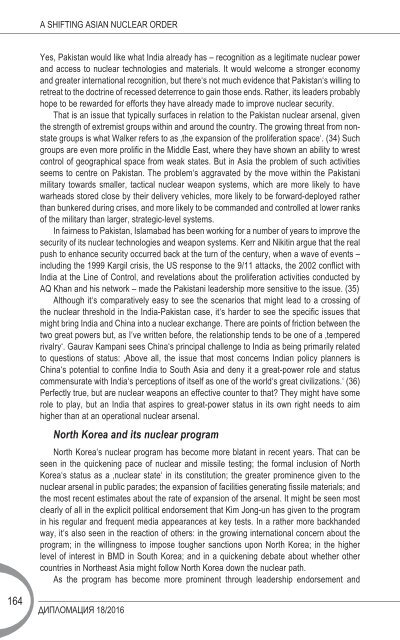DIPLOMACY ДИПЛОМАЦИЯ
2kGfdFv
2kGfdFv
Create successful ePaper yourself
Turn your PDF publications into a flip-book with our unique Google optimized e-Paper software.
A SHIFTING ASIAN NUCLEAR ORDER<br />
Yes, Pakistan would like what India already has – recognition as a legitimate nuclear power<br />
and access to nuclear technologies and materials. It would welcome a stronger economy<br />
and greater international recognition, but there’s not much evidence that Pakistan’s willing to<br />
retreat to the doctrine of recessed deterrence to gain those ends. Rather, its leaders probably<br />
hope to be rewarded for efforts they have already made to improve nuclear security.<br />
That is an issue that typically surfaces in relation to the Pakistan nuclear arsenal, given<br />
the strength of extremist groups within and around the country. The growing threat from nonstate<br />
groups is what Walker refers to as ‘the expansion of the proliferation space’. (34) Such<br />
groups are even more prolific in the Middle East, where they have shown an ability to wrest<br />
control of geographical space from weak states. But in Asia the problem of such activities<br />
seems to centre on Pakistan. The problem’s aggravated by the move within the Pakistani<br />
military towards smaller, tactical nuclear weapon systems, which are more likely to have<br />
warheads stored close by their delivery vehicles, more likely to be forward-deployed rather<br />
than bunkered during crises, and more likely to be commanded and controlled at lower ranks<br />
of the military than larger, strategic-level systems.<br />
In fairness to Pakistan, Islamabad has been working for a number of years to improve the<br />
security of its nuclear technologies and weapon systems. Kerr and Nikitin argue that the real<br />
push to enhance security occurred back at the turn of the century, when a wave of events –<br />
including the 1999 Kargil crisis, the US response to the 9/11 attacks, the 2002 conflict with<br />
India at the Line of Control, and revelations about the proliferation activities conducted by<br />
AQ Khan and his network – made the Pakistani leadership more sensitive to the issue. (35)<br />
Although it’s comparatively easy to see the scenarios that might lead to a crossing of<br />
the nuclear threshold in the India-Pakistan case, it’s harder to see the specific issues that<br />
might bring India and China into a nuclear exchange. There are points of friction between the<br />
two great powers but, as I’ve written before, the relationship tends to be one of a ‘tempered<br />
rivalry’. Gaurav Kampani sees China’s principal challenge to India as being primarily related<br />
to questions of status: ‘Above all, the issue that most concerns Indian policy planners is<br />
China’s potential to confine India to South Asia and deny it a great-power role and status<br />
commensurate with India’s perceptions of itself as one of the world’s great civilizations.’ (36)<br />
Perfectly true, but are nuclear weapons an effective counter to that? They might have some<br />
role to play, but an India that aspires to great-power status in its own right needs to aim<br />
higher than at an operational nuclear arsenal.<br />
North Korea and its nuclear program<br />
North Korea’s nuclear program has become more blatant in recent years. That can be<br />
seen in the quickening pace of nuclear and missile testing; the formal inclusion of North<br />
Korea’s status as a ‘nuclear state’ in its constitution; the greater prominence given to the<br />
nuclear arsenal in public parades; the expansion of facilities generating fissile materials; and<br />
the most recent estimates about the rate of expansion of the arsenal. It might be seen most<br />
clearly of all in the explicit political endorsement that Kim Jong-un has given to the program<br />
in his regular and frequent media appearances at key tests. In a rather more backhanded<br />
way, it’s also seen in the reaction of others: in the growing international concern about the<br />
program; in the willingness to impose tougher sanctions upon North Korea; in the higher<br />
level of interest in BMD in South Korea; and in a quickening debate about whether other<br />
countries in Northeast Asia might follow North Korea down the nuclear path.<br />
As the program has become more prominent through leadership endorsement and<br />
164<br />
<strong>ДИПЛОМАЦИЯ</strong> 18/2016


